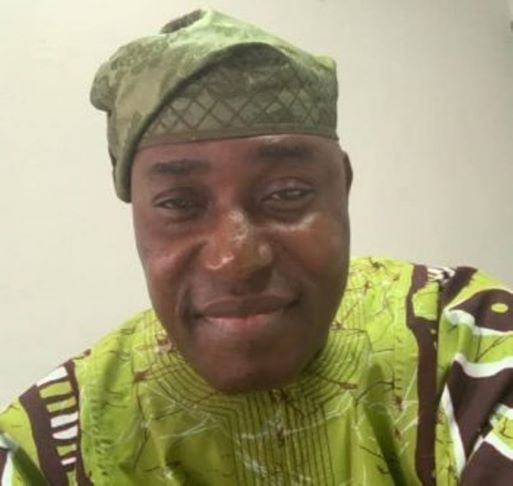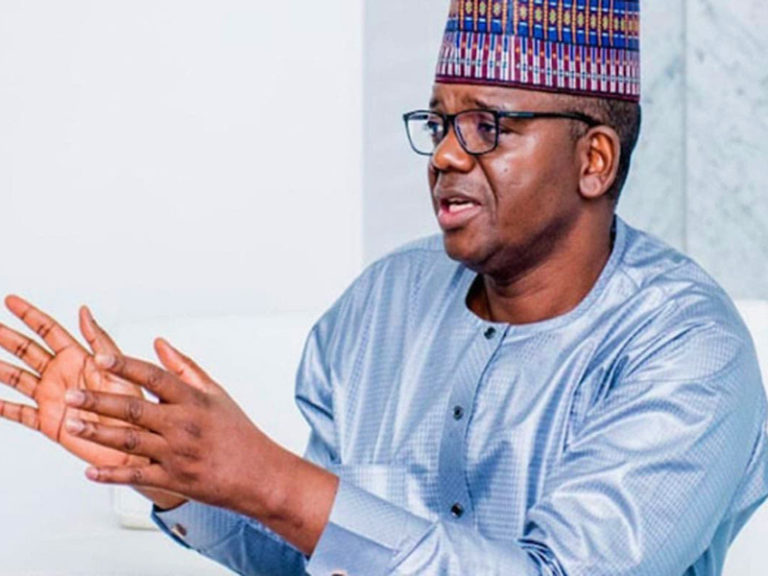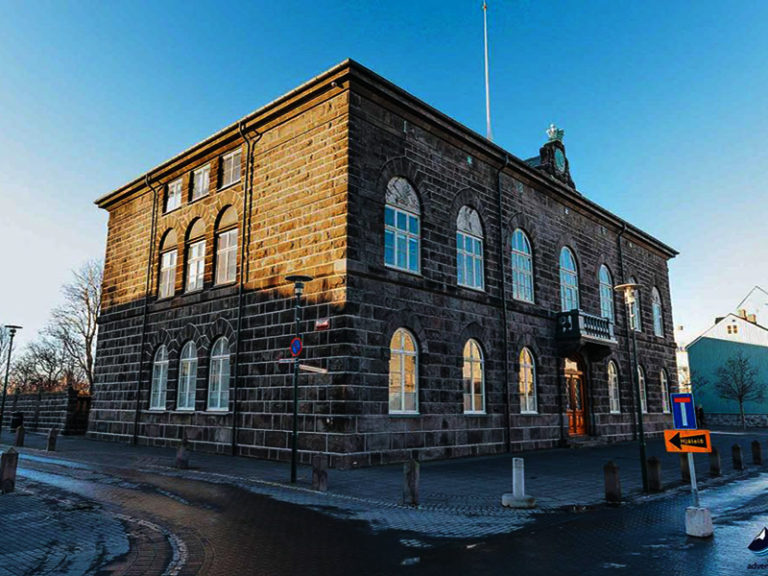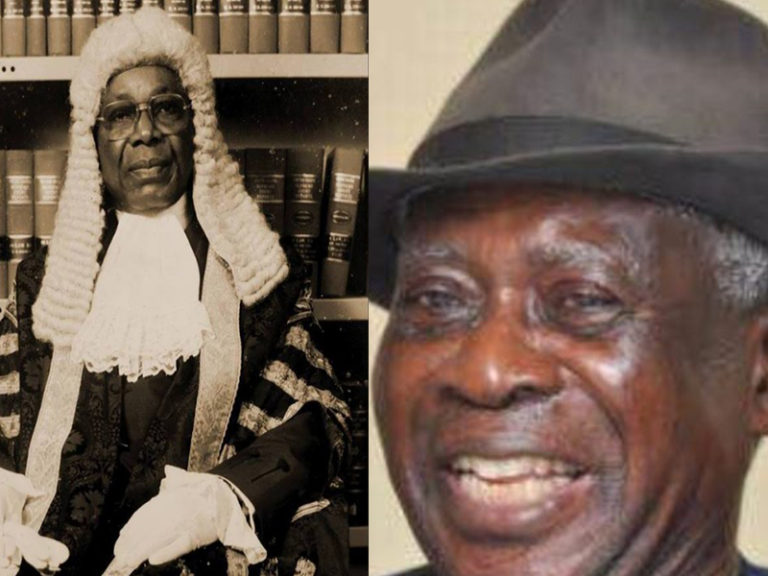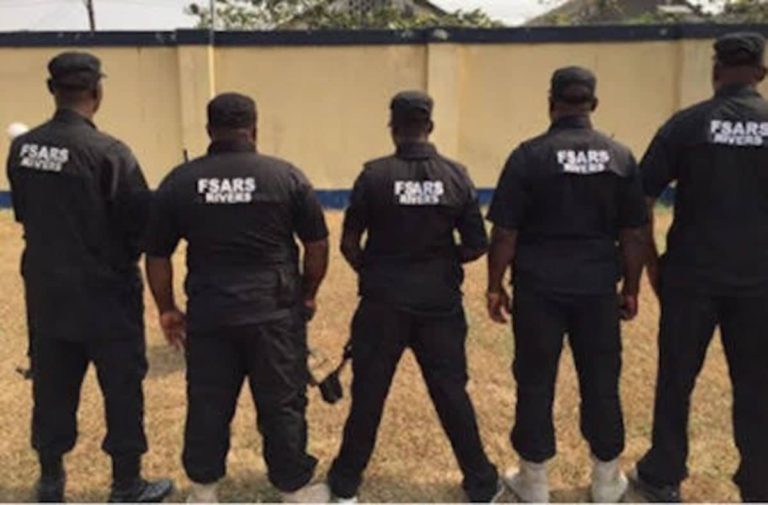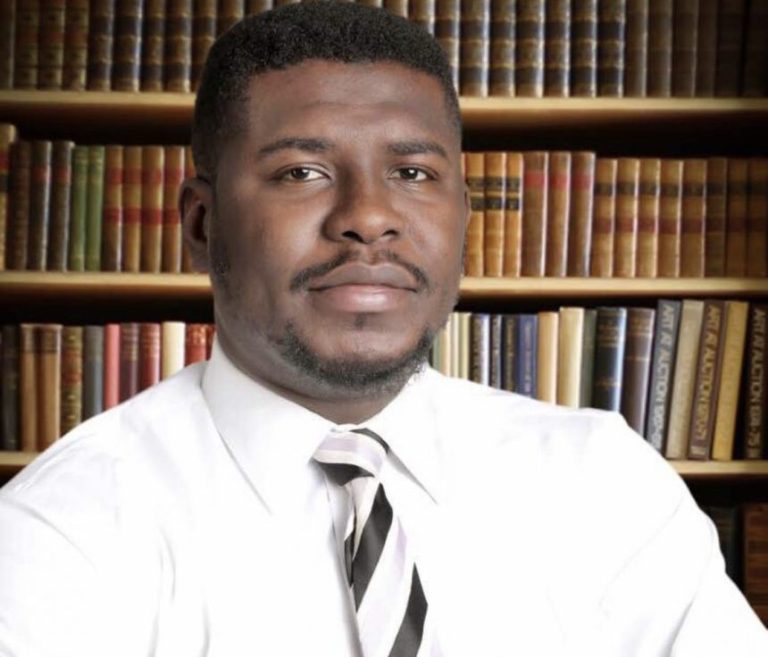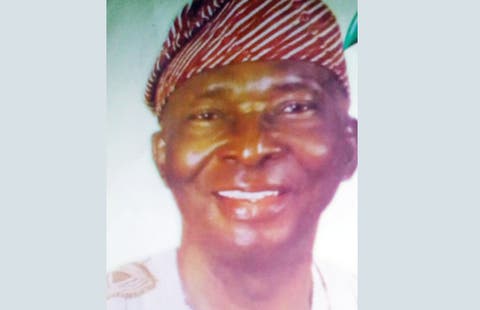By Amb. Godknows Igali, Ph.D
The closing days of the month of September each year will, for a long time to come, be moments of perpetual memorial for the Nigerian Supreme Court as an institution and its members, past and present.
This is understandably so, as the lives and times of two of Nigeria’s most eminent jurists, moralists and pathfinders, the late Justice Chukwudifu Oputa (1924-2014), and his younger colleague and brother, Justice Adolphus Karibi-Whyte (1932-2020), will for related reasons be remembered and celebrated. For Justice Oputa, this time of the year particularly the 24th of September marks his birthday and on this occasion, it was the 96th Posthumous celebration. Relatedly, the series of passage-rites leading to the final resting of Justice Karibi-Whyte were held on Saturday, 26th September 2020 in the coastal town of Abonema, Rivers State.
SHARED PURSUIT OF PERFECTION
Expectedly, these two events attracted audiences of family, friends, and professional colleagues from Nigeria and around the world. They came in numbers and as it is the norm these days of Covid-19, on Zoom Virtual platforms; all saluting the scholarship, erudition, and idealism of both men. Like many of the Judges of the nation’s appellate judicial system of their time which some writers regard as “a golden era”, both were men of great moral fibre and sterner human refinement. They had both found themselves in the highest judicial echelon during an era when the calling to serve in the apex court in Nigeria or any country for that matter, was understood as the “tour de force” of any mortal activity. To them, the judiciary was more than a vocation but rather to be seen as the most sacred human calling before God Almighty Himself.
The common emotional thrust of most judges of their time, rather ambitiously, was the pursuit of some form of self-imposed perfectionist credo. Their outlook to life and standards in all areas were excessively self-tasking even against all known psychological and philosophical disinclinations towards perfectionism. Despite the fact that one writer puts it that, “the problem of being a perfectionist is that everything has to be perfect. The problem with being human is that nothing is perfect,” yet Justice Oputa and Justice Karibi-Whyte held unrepentantly to the belief that the object of rewarding judicial demeanour is not just the pursuit of some form of sinlessness, but to become somewhat angelic. So, in their shared character traits, they were unassailable with almost a dutiful account of nearly every daily activity of their often-lengthy years. In actual living, they were stoic, spartan and conservative. In particular, they were never found wanting in several matters of morals and dealings with the temptation of money, which the scriptures describe as the “root of all evil.” Indeed, one of their peers Justice Victor Ovie Whiskey, few years ago was remembered to have exclaimed, “I will faint if I ever saw N1m in front of me.”
On matters of learning, that is the study of Law and mastery of the canons, precepts, statutes and constitution of the land, they were simply profound and outstanding. The depth of scholarship was formed as a result of their simple brilliance and unbeaten record of high-level performance in places of study during their formative years.
ABRIDGED HALL OF FAME
In their ranks were many other great Nigerians who came to the limelight from 1954 when the Federal Supreme Court was established, up to the actual take-off of the Supreme Court of Nigeria on Oct 1st, 1963. It is difficult to capture all here, but some of the great Justices whose names are in this vaunted hall of fame include; Olumoyiwa Jibowu, Louis Mbanefo, Charles Onyeama, Chukwuwike Idibe, Joseph Adefarasin, Ademola Adetokunbo, Taslim Elias, Egbert Udo Udoma, Dr. Nabo Graham-Douglas. Others are; Akinola Aguda, Patrick Acholonu, Anthony Aniagolu, Atanda Fatai Williams, Sir Darley Alexander, Dan Ibekwe. There were also such great names as; Justices Kayode Esho, Idris Kutigi, Mohammed Bello, Katsina Alu, Chief George Sowemimo, Niki Tobi, Mohammed Akanbi, Ayo Irekife, Andrew Obaseki, Mamman Nasir, Dahiru Mustapha, etc.
More exciting is the fact that despite the rather sweeping aspersions nowadays, there are so many other eminent judges still alive in retirement, now reservoirs of moral rectitude of the realm. Equally, are no few of their successors still in active service who continue to thrive above the unassailing challenges of moral decadence and rather desperate political ecology. They are heirs of the near-perfectionist mantra of the founding fathers of their profession. Far away from the bright lights of the media and public acclaim, their impact on society and succeeding generations on the practice of law, public good and state-building have been based on the singular record of the highest levels of professional accomplishment and pursuit of truth.
THE OGUTA – ABONEMA ECONOMIC CORRIDOR
Although the lives of no two persons follow exactly the same trajectory, there exists an intriguing casual connection and wide overlap between Justices Oputa and Karibi-Whyte on several fronts.
Justice Chukwudifu Akunne Oputa continues to stand tall even now, six years after his death, perhaps, as the most prominent son of the lakeside town of Oguta – Ameshi, in Imo state. Apart from being one of the most picturesque locations in Nigeria, for a town that is on Nigeria’s biggest inland natural lake after Lake Chad, its waters are connected to the Njaba River, Orashi River, and ultimately the River Niger. Oguta therefore became a natural inland entry port for British Colonial rule into much of the Igbo country. The fact that Oguta provided a unique confluence between its blue waters and the waters of the Orashi River, the major tributary of the River Niger, made it a great point of touristic attraction to which was added its lush tropical forest. These also provided one of the best locations for the growth of palm oil trade, a product much needed in Europe at the time. Accordingly, Oguta became, arguably, the main centre of what the Europeans came to call the “centre of trade” with the hinterland. Very soon, such companies as Royal Niger Company and United Africa Company (UAC) moved in to set up in the area. It also became the early seat of the colonial and missionary incursion into several parts of Nigeria’s South East from the late 19th Century. Through the lake’s waterways connecting all the 27 villages in Oguta and such major Igbo towns as Owerri, Orlu, Amigbo, Okigwe Nkwerre, Mgbidi and covering various locations in Rivers State.
With flourishing trade, Oguta also became one of the central points of Igbo civilization, scholarship and knowledge from the late 19th century. The rich demographic admixture with the geo-cultural and geo-strategic location of the town, made it a centre of all sorts for the generation of a micro-civilization that was peculiar to it. Today, Oguta has become a signpost also for the modern Crude Oil and Gas industry; which along with few other communities, also gives Imo State a seat on the pantheon of oil producing states in Nigeria. So, international oil companies such as Shell Petroleum Development Company, Chevron Texaco Overseas, and few other local oil producers have operations around the area. Going down south, Justice Karibi-Whyte came from the Kalabari stock of the Ijaw ethnic nationality. The Kalabaris, for various reasons, are one of the most educationally advanced sub-groups in all of Nigeria. They boast amongst the first Nigerians to have received western education and therefore have a line-up of some of the nation’s first educated people such as; Dr. G.K.J. Amachree, (first Solicitor General of Nigeria and first black man to be United Nations Deputy Secretary General), Dr. Aroloye Ajumogobia (first Permanent Secretary, Federal Ministry of Education), Amb. Joe Iyalla (pioneer diplomatic patriarch), Dr. Nabo Graham Douglas, (first Queen’s Council along with Chief Rotimi Williams), Prof. Kelsy Harrison (leading global Gynaecologist) amongst many others. Yet still, Karibi-Whyte emerged as one of the greatest sons of Rivers State.
Just like Oputa, Karibi-Whyte grew up along the shores of the Abonema River, which has for centuries created the pathway for Europe’s penetration into the Nigerian hinterland, also in search of goods they called legitimate. This was after abolishing the ignominious slave trade which had gone on for about 400 years. With the founding of Abonema in 1882 when the Kalabari kingdom split into 3 main towns – Buguma, Bakana and Abonema and over 55 other smaller communities, this town became known as “York City” due to its modernist outlook. It also emerged as the nerve centre of Europe’s thriving trade in agricultural produce with the area that was given the name “Oil Rivers Protectorate” in 1886. This was later changed to “Niger Coast Protectorate” in 1893. Abonema, like its other counterparts, soon ended up with prominent Merchant-Warriors, many of whom took on European names such as; Chief Young-Jack, Boy-White, Black-Duke, Bobmanuel, Horsefall, Briggs, etc.
To this day, the town is adorned with historical monuments such as warehouses and quarters of European companies. Again, by dint of nature’s underpinning, Abonema, like Oguta is also one of the main nerve centres of Nigeria’s present crude oil and gas industry which provides the entry into the famous oil-rich Cawthorn Channel and OML 18 on-shore swamps, covering an area of over 1,000 square kilometres.
Interesting enough, between Oguta and Abonema grew a flourishing economic corridor in course of history, as the forbearers of both jurists were central figures. Oputa’s father Uzoukwu Oputa, was a Chief and strongman with 10 wives, and controlled all manner of affairs at about when colonial incursion made its way into the area. With tens of children, the less aggressive but bookish Chukwudifu was the last. Down in the creeks on the Atlantic shores, young Adolphus was also born into two strong families of commercial warlords of the late 19th Century – Boto (Boy-Whyte) and the Iju-Jack group.
FAITH, CULTURE AND MUSCIAL HERITAGE
Besides their love for law and order, and the straddling recurrence of family antecedents, both Oputa and Karibi-Whyte shared a lot of similarities going back to their very formative years. As a result of the socio-cultural ambience in which they both grew, though belonging to one of the most conservative professions, and rising to the highest appellate court, they were men of great religious piety and cultural appreciation. For this, they attracted to themselves, custodial rights and duties over the inherited traditions of their people. Hence Oputa held several traditional titles in Oguta and was one of the highest grades of traditional aristocracy. Also, Karibi-Whyte was the traditional head of Iju-Jack and Boto-Whyte group of houses in Abonema.
These, in no way, impinged on their Christian traditions as they performed life-time service to God’s work in their churches respectively. Both grew up in the Church and in course of life, rose to become high-graded Knights and defenders of the faith. Oputa was Knight-Commander of Saint Mulumba and St.
Gregory, one of the highest Orders within the Catholic Church. Karibi-Whyte, a Knight in the Anglican Church, and was once the Chancellor (Head Legal Counsel) of the entire Church of Nigeria. This again in itself formed their austere outlook to life.
They were great lovers of Classical Music, which they both acquired from their law training in universities and ancient “Inns” of law study in the United Kingdom and growing up in the church. This love for music is imprinted in their progeny with Justice Oputa producing one of Nigeria’s most vivacious entertainers and high-minded pundits, Charles Oputa, better known as “Charlie boy” or in these latter days “Area Father.” Similarly, all of Karibi-Whyte’s children are great patrons of the best performing choral groups, both in Lagos where most of them have their professional practices, and their home town of Port Harcourt.
OBSESSION WITH KNOWLEDGE AND “BOOKISHNESS”
As it was a tradition for most young people of that generation both Christians and Muslims around Nigeria, missionary schools were always the beginning. Oputa began his primary education at the Sacred Heart School, Onitsha before proceeding to Christ the King School, Onitsha. From there, he continued to Yaba High College, Lagos and finally to Achimota College Ghana, where he obtained his first degree in Economics. Achimota College was where other Africans such as the Great Kwame Nkrumah, Edward Akufo-Addo, Jerry Rawlings and John Evan Atta-Mills, all former Presidents of Ghana, as well as Sir Dawada Jawara of Gambia and Robert Mugabe of Zimbabwe, attended. On return from Ghana, he taught briefly at African College along with Prof. Chike Obi and Dr. Pius Okigbo, before becoming the Principal of Kalabari National College, in Abonema. Endlessly searching for knowledge, he read studiously and obtained another Bachelor’s Degree in History from the University of London. Yet still, untired and unfettered, he “crossed the oceans,” as was commonly said in those days, to the United Kingdom to read Law and obtained a degree in 1953. He was also called in same year into the coveted Gray’s Inn as a Barrister.
In a similar vein, Karibi-Whyte had left laurels almost everywhere he had his public education. Having completed his primary education in Abonema in a missionary school as well, he proceeded to attend the Kalabari National College which trained almost all the famous persons from this area that have served Nigeria. In an interesting twist of destinies, Oputa was Karibi-Whyte’s Principal at Kalabari Native College along with his erstwhile classmate Prof. Tam David-West and many others. He went on to work as a Court Clerk for some years before proceeding to the United Kingdom to study, obtaining his degree in 1960 from the University of Hull. Established in 1927, one that has been a training ground for many British statesmen. A year later in September 1961, he was called to the Bar at the Middle Temple Inn. Like Justice Oputa’s Gray’s Inn, this British Bar training had since the 12th-13th century, been vested in many such ancient “Inns” or societies. Still not satisfied, he went on to the University of London to obtain a Master’s degree in Law (LLM) and finally earned for himself a Ph.D. in Law from the University of Lagos where he was already teaching Law.
A TOP LADDER OF PROFESSIONAL APOGEE
Justice Oputa had a very successful practice in law on his return to Nigeria, handling a number of high-profile cases in which it was almost as if he was destined to win always. This continued till 1966 when he was appointed a High Court Judge in Eastern Nigeria. Ten years later, he was elevated to become the first Chief Judge of Imo State and moved on higher to the Nigerian Supreme Court in 1984, until his retirement in 1989. During the period, he left behind some of the most quoted judgements till date. He also earned for himself a name from the former Chief Justice Mohammed Bello as the “Socrates of the Nigerian Supreme Court.” Justice Oputa was practically known for his very studious, philosophical and almost unassailable judgements, which were a great metaphor for wisdom, theology and philosophy. As if to confirm this, Ambassador Godknows Boladei Igali was particularly privileged to encounter Justice Oputa closely in October 2002, shortly after the World Court judgement on Nigeria and Cameroun’s border dispute. While serving as Nigeria’s Consul-General, he was requested by the Cameroun Bar Association to be invited as the Guest Speaker for their Bi-Annual Bar Dinner in 2003 when he came visiting. In an audience that included the Chief Judge of Cameroun, many senior Judges, senior members of the Bar, and senior teachers of the Law, in the coastal town of Limbe (formerly Victoria), Justice Oputa expounded on what he termed the “Raison-d’etre of Judgements.” His conclusion was that a judgement at the appellate level only makes meaning if it could be implemented and not left in doubt. He alluded that it was like “communicating the voice of God.” In this, he used Julius Caesar’s sixteenth century play “Merchant of Venice” as text. Shocking to his audience, he quoted without text, almost all the dialogues between the main protagonist, that is Antonio and the supposed Jewish money lender, Sherlock. In the same manner, he quoted about four pages from Mark Anthony’s “Funeral Oration for Julius Caesar,” in the landmark novel named after that Roman Emperor. And last, he was able to recite off-head the “Beatitudes” listed in “Sermon on the Mount,” as contained in the three long chapters of the Holy Bible in Matthew Chapters 5-7. The impact of this on Cameroun’s top judicial authority is better left to conjecture at a time when they were in conflict in Nigeria as his emphasis were on such virtues as forbearance.
For Justice Karibi-Whyte, it was after his sojourns that he took up an employment with the Rivers State Judiciary as a draftsman in 1973, and rose to become Solicitor General of the State. From there, he moved to the Federal Revenue Court as a Judge, and in the course of time, proceeded to become Judge at the Court of Appeal in 1980. He later joined Justice Oputa, his erstwhile “master” in the Supreme Court in 1984 where he served for 18 odd years.
CHRONICLES OF TIRELESS NATIONAL SERVICE
Besides sitting on the bench and passing out judgements, the Nigerian Judiciary has particularly shown great versatility in its service to the country in other aspects. They have often adapted to varied assignments and functions as the occasion demands, especially in chairing some administrative and pseudo-judicial assignments. Some have served as Chairmen of National Electoral Commissions and Panels of Enquiries, others have been Ambassadors and High Commissioners, while some others have risen up to the occasion in other critical assignments. In these two latter areas, few have performed the multiple roles that both Oputa and Karibi-Whyte played.
In Justice Oputa’s post-retirement life, he was called out by then President Olusegun Obasanjo (OBJ) to take a periscopic back review of human rights abuses during the chequered years of military rule in Nigeria. This came against the backdrop that OBJ himself had been a victim of grave human rights abuses, having been sentenced to death under circumstances that were rather obscure. President Obasanjo who took the reins of power after nearly 31 years of disjointed military rule, insisted on a Human Rights Investigation Commission, in what was similar to South Africa’s Truth and Reconciliation Committee, then Chaired by Archbishop Desmond Tutu. With such eminent persons as Nigeria’s “Liberation Theologists” and Catholic Bishop of Sokoto, Matthew Kukah by his side, the Commission was intended to help heal the pains of military atrocities.
Like Bishop Tutu who collapsed at some revelations, Oputa and his commission members had their breaking points along the line of the work of the panel. In his dying days at the National Hospital Abuja in 2014, Justice Oputa soliloquized that the report of his panel has been “oputarized”, a sobriquet for putting away a good work to accumulate dust on government shelves, as it is with many other good studies on many national issues.
Outside this relatively recent high-profile function, throughout Oputa’s public career, he performed many other ad-hoc responsibilities including being on Eastern-Central Nigeria Marketing Board and chairing East-Central States’ Commission on Revenue Collection. He also chaired Federal Government Enquiry into Scarcity and Petroleum Products in Nigeria, which led to the establishment of three more refineries – Warri, Kaduna and Port Harcourt II. He was also Chancellor of Imo State University, President Nigeria Red Cross Society, and President Nigeria Society for Prevention of Accidents.
On his part, Karibi-Whyte also had a robust stint in his teaching of Law, rising to the level of an Associate Professor. It was therefore easy for him to fit in to other duties as Chairman of the Nigeria Constitution Conference 1994-1995, which prepared the main backbone for some of the contents of the 1999 Constitution. He was also Chairman, Currency Counterfeit Tribunal; Chairman, Enquiry into Nigeria Agricultural and Cooperative Bank, and Chairman, Civil Disturbances Tribunal. Still at the federal level, he was also Chairman of Unification and Reform of Criminal Code, Penal Code, Criminal Procedure Act and Criminal Procedure Code.
He was also Chairman, Nigerian Institute of Advanced Legal Studies and served as Pro-Chancellor of the Rivers State University and Committee of Pro-Chancellors in Nigeria. At the international level, he was also appointed Judge of the International Criminal Tribunal of Yugoslavia, a role in which he stood out among the best in a clime where there were several international jurists.
In the annals of law report in Nigeria, Justice Karibi-Whyte remains one of the most quoted justices in Law references. His Judgements were penetrating, legally incontrovertible and lucid with sterling clarity. He combined academics and practice of Law and therefore it was almost impossible to question his thoughts on the main tenets of his decisions, leaving for posterity, precepts and precedents which are almost cast in iron. To this, they both had the highest national honours and several honorary academic awards.
EPILOGUE
It was once said that, “justice is the constant and perpetual way to allot to every man his due.” But how true this is remains rather debatable, as each man seems to have his own perception of what is right and wrong. While even our senior practitioners of law both on the bar and bench are wont to idolize others such as; Lord Tom Denning, a Baron and Jurist of the English Judicial System, and United States’ legal luminary and civil rights activist, Justice Thurgood Marshall, due to their footprints on the Common Law tradition, it is intrusive to note that “what we search for in Sokoto is often in our shokoto.” The Nigerian Judiciary since the mid-20th Century when it started to come of age, has left for us great legacies of worthy service, not only while wearing their hallowed wigs and gowns and on the exalted bench, but on lessons they have left for the society as a whole.
Oputa left this world at the age 90 (even though Area Father thinks “the old man pass 100”) and Karibi-Whyte followed suit at 88 years. Their legacies are emblematic of a generation that appeared holier than even the angels, in a manner that all of society will always remember them. As it was with Oputa’s final resting moments when Owerri and Oguta had week-long celebrations of carnival mood, Port Harcourt and Abonema had their own unique experience. Legal processions, choral concerts and outings of some of Kalabari’s most revered masquerades, with thundering bellows of canons heralding the exit of a great hero. It remains to say “Adieu Opu dau” as you join your elder brother and other friends gone before, to your final rest.
As we remember these two great Nigerians, it is apt to reflect that a viable Justice system as another famous jurist once said “requires rule of law and justice in a judicial system in which the rights of some are not secured by the denial of rights to others.” Our collective challenge as Nigerians is to recognize as a people, our collective humanity and the price we owe each other and be fair and just to one another as citizens of our country. We must therefore, fight inequality and fight injustice together, and hoping that all Nigerians will hold the need for us to build the country, where justice is at the doorstep of all unfeigned.
…Amb. Godknows Boladei Igali is a former Ambassador and Federal Permanent Secretary. NNL.



